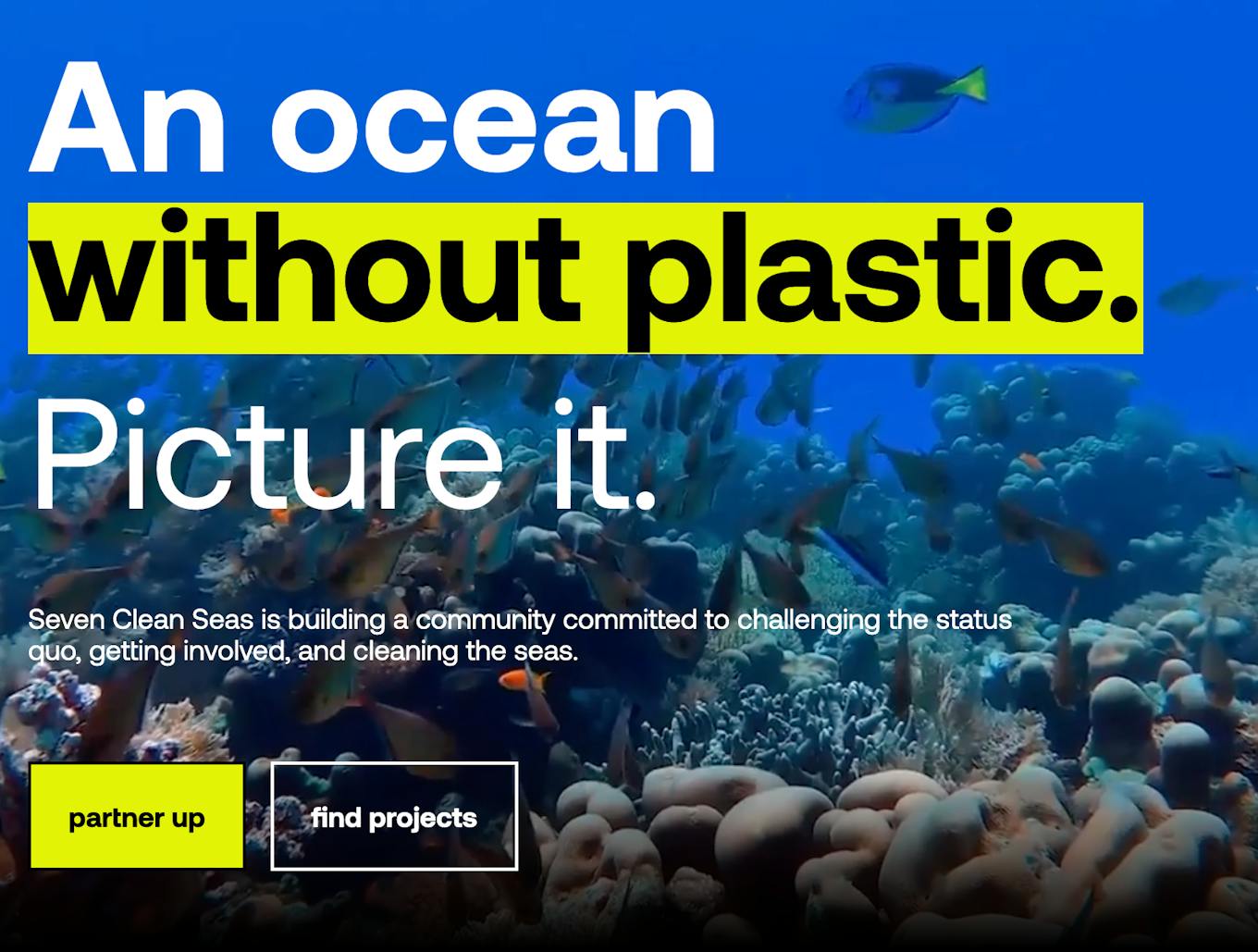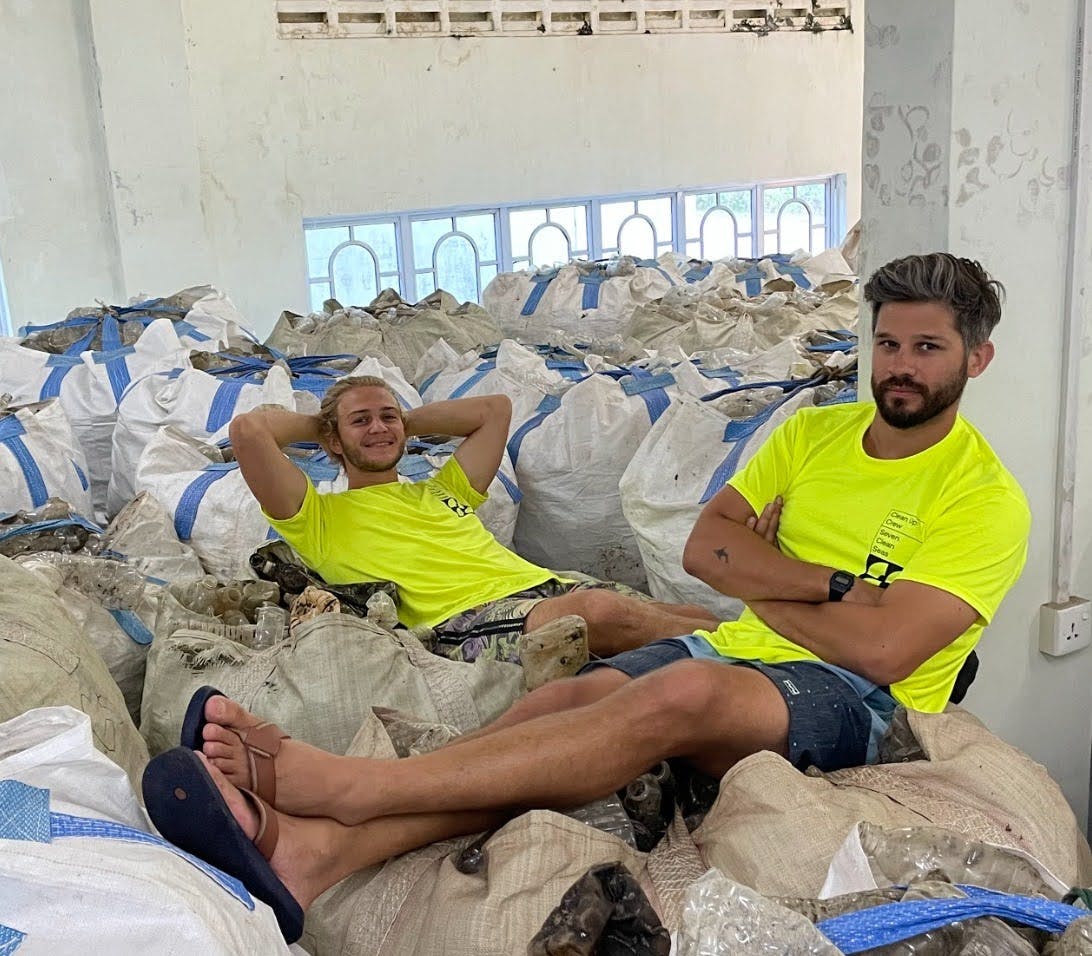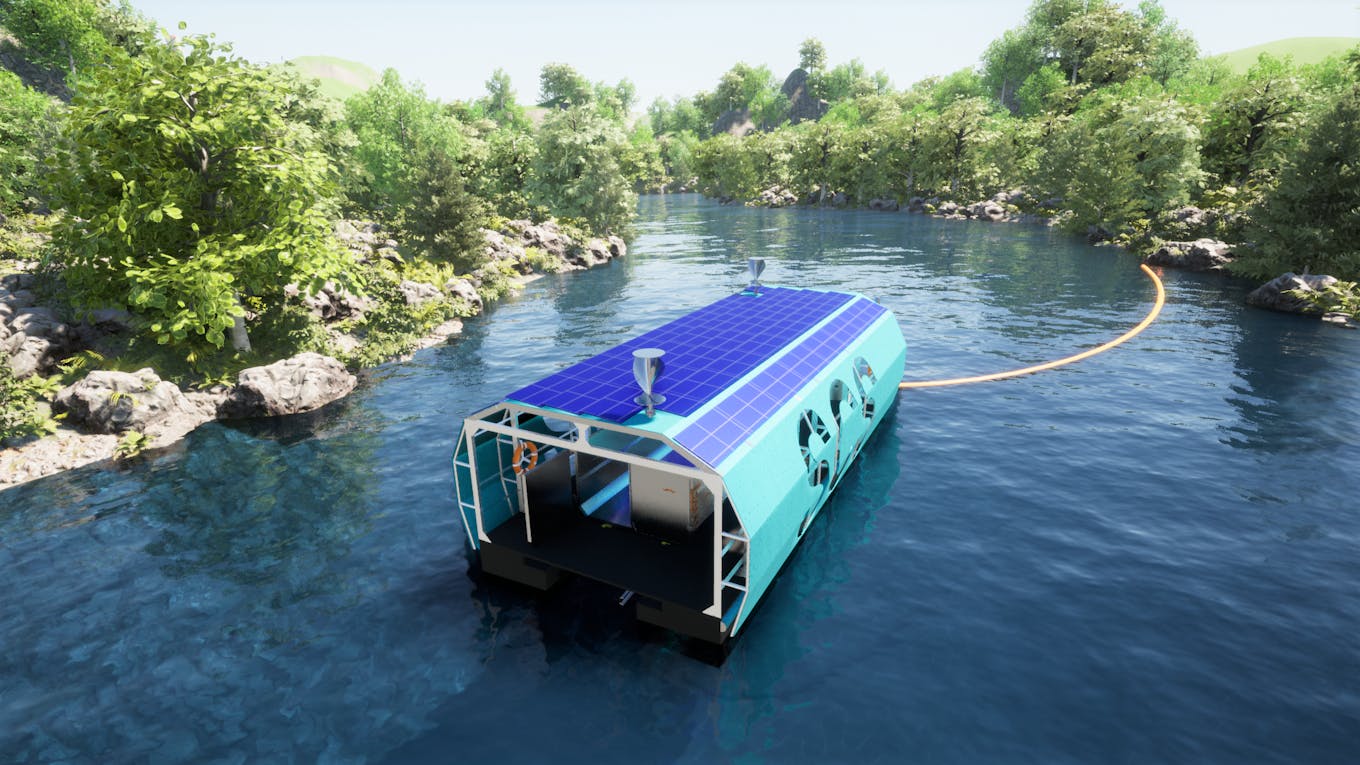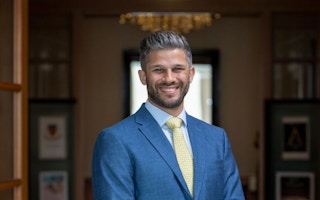It was like flicking a switch, says Tom Peacock-Nazil, co-founder and chief executive of Bali-headquartered marine pollution clean-up and plastic credits company Seven Clean Seas (SCS). When the firm he started in 2018 almost quadrupled in size to 15 employees in 2022, he noticed things get exponentially busy and the business take on a life of its own.
To continue reading, subscribe to Eco‑Business.
There's something for everyone. We offer a range of subscription plans.
- Access our stories and receive our Insights Weekly newsletter with the free EB Member plan.
- Unlock unlimited access to our content and archive with EB Circle.
- Publish your content with EB Premium.
“Scale does strange things to an organisation,” says the Brit, a reluctant former recruitment consultant and financial advisor (“I hated both and wasn’t good at either,” he says) who started SCS as a side-hustle in Singapore after noticing apocalyptic piles of plastic trash accumulated on beaches in Southeast Asia, and dove into the business of ocean plastic offsetting full-time in 2019.
His firm cleared 459,722 kilogrammes (kg) of plastic trash from Indonesian coastlines last year – an increase of 138 per cent over 2021 – and formally employed 66 people as beach cleaners. SCS has just hit the 1 million kg mark, and he expects to clear up 1.8 million kg of plastic by the end of 2023.
“The last four and a half years have been pretty incredible. But it’s in the last 12 months that things have really motored,” says Peacock-Nazil, whose firm’s brisk growth caught the attention of the judges of the Eco-Business A-List, an annual search for impactful sustainability professionals that attracted more than 100 nominations this year.
In 2022, SCS added a new facility in Batam, Indonesia, to its operations in neighbouring Bintan, and is now collecting up five tonnes of plastic from beaches a day, funded mainly by corporate customers who pay for the clean-ups through plastic credits. The collected plastic is either sent for recycling or incinerated in waste-to-energy plants. SCS aims to launch a river clean-up system in Thailand (a launch in Vietnam in 2021 didn’t work out) some time this year.
“
Having a child and trying to scale a business at the same time… I don’t recommend it.
Tom Peacock-Nazil, co-founder and CEO, Seven Clean Seas
Peacock-Nazil dreams of removing 10 million kg of plastic from the environment and formally employing 200 beach cleaners by 2025. “If we’re not obnoxiously ambitious, we’re not going to make a dent in ocean pollution – it is such a gargantuan issue,” he says. “We want to be in rural and remote island locations everywhere to build waste management infrastructure.”
SCS hasn’t always been a sure thing. In 2019, the year after a German vegan condom manufacturer called Einhorn gave Peacock-Nazil a “light-bulb momentum” that building a business around plastic credits might just work, the plastic credits business didn’t take off. The following year, the Covid-19 pandemic hit and took 100 per cent of SCS’s revenue overnight.
It took a partnership between Peacock-Nazil and his friend Andrew Dixon, the director of luxury island resorts Nikoi Island and Cempedak Island, to get the business back on track. Dixon had had to furlough staff when his hotel business dried up so Peacock-Nazil hired 18 of them for clean-up projects on Bintan. Images in social media of armies of beach cleaners in SCS-branded T-shirts was the tonic Peacock-Nazil needed.
“As soon as people saw that we had a project and we were employing people, that was the springboard we needed to make the case for plastic credits. It’s been snowballing ever since,” he says.
Peacock-Nazil’s business still faces a credibility problem. Critics say that offsetting plastic simply allows plastic polluters to carry on polluting, just like carbon credits allow emitters to carry on emitting. Peacock-Nazil’s position is that he won’t allow any company to offset their plastic use with SCS if they do not measure their plastic footprint and reduce as much as they can first.
Employing beach cleaners on a permanent basis gives credibility to his plastic credits, which he admits are expensive. “[Plastic credits] will be a race to the bottom ultimately, and it will probably go the same way as carbon credits. That might sound controversial coming from me, but that doesn’t mean that plastic credits can’t be used in a good way,” he says.
SCS is built on a blended finance model, using philanthropic funding to supplement revenue from plastic credits to invest in waste management infrastructure such as a materials recovery facility in Bintan. SCS has been profitable since its first year, but after investing in expansion the firm’s profits have been squeezed. Peacock-Nazil expects the firm to be profitable again by the end of this year.
“Probably most people in waste management think we’re a gimmick. But the reality is, if it was profitable to build waste management [infrastructure] in remote island locations, doing it the way they do it, other players would be there,” he says.
In this interview, Peacock-Nazil talks about the mistakes he’s made, the best business decision he ever made, having a child while trying to scale, and how he’s avoided burnout.
What are the biggest mistakes you’ve made that you’ve learned from as an entrepreneur?
We’re going to need a longer interview. One of the biggest learning experiences has been hiring on talent, not on passion. As a business owner, it’s so important to make sure that your people are aligned with your vision. Even if that person is 20 per cent less technically capable [than a more talented individual], with passion and a good environment they’ll bridge that gap in no time. I cannot overstate that. It’s alluring to get interest from really high-performance people, but they’re a real risk to the business if they don’t care about the mission.
“
We’re not afraid to say controversial things about players in the industry that some are scared to engage with.

Seven Clean Seas’ new website
Another mistake has been insufficient technical knowledge. We’ve just launched our new website. It’s taken us five renditions over four and a half years to get to a point where we have a really professional website. I guess it’s been a case of the never-ending Bootstrap – not wanting to spend money on things and trying to do it all yourself. But when you start to grow, you’ve really got to start looking at your shop front. People find us mostly through social media and our website, not through our operations in Bintan or Batam. I’ve learned that you need a team you trust that have strong networks of tech professionals. That holds them personally accountable for the people they recommend and minimises the risk that the work isn’t good.
Seven Clean Seas has been profitable since its first year – how?
From the very beginning, we did beach clean-ups and educational talks in Singapore, which gave us a revenue stream. We took that money and invested it into building the big idea around plastic credits and building waste management projects.
I strongly believe in building businesses for impact and making sure they do not become profit-focused. A big part of that is making sure that you don’t take money from the wrong people, whether that’s philanthropy that comes with terms or conditions, or investment that comes with a seat on the board of somebody who’s got an agenda.
At various times, we’ve solely relied on revenue, to cover our operational costs, and philanthropy – it’s a blended finance approach. But building scalability does require external capital at some point, and we started to raising capital mid-2022. It was just as I was having a kid. That almost finished me off. Having a child and trying to scale a business at the same time… I don’t recommend it.
How have you found the time to have a child and run a startup?
This is a long term play for me. I will still be doing this in five years. So then the question is, when is the right time to have a kid? It’s an impossible question. We didn’t realise that we were going to have to raise capital until a few months into the pregnancy. Pregnancy is not something you can have a discussion about, and neither is the need to raise capital and scale.
Why did you need to raise capital?
We got to the point that our plastic credits business was starting to work, and we needed to build out our sustainability consultancy team and bring in project managers, because it was just me and Ben (Moody, Seven Clean Seas’ co-founder) doing everything, and it was a disaster. Ben and I are not the most detail-oriented people, and not the best at building and operating complex systems and projects.
We needed to raise capital to build out our capabilities, and received funding from ECCA Family Foundation, which has supported us before. They put us through our paces, like we were a normal startup. That was a good experience for me because it really made me question whether we are in fact a good business. Are we are we going to be around in five years or is this just to feel-good phase? ECCA now has one seat on the board and they push us to report on impact, not just on profit.
As soon as we took the investment, we invested that in our capabilities and were no longer profitable. It made our operational expenses sky-high. But we’ve scaled up sales and our projects and are doing really well. We’re on target to be profitable again later this year.
How have you avoided burning out?
While running a startup has been very stressful, I’ve always tried to keep my weekends for myself. And I’ve picked an hour or two every week day for something I love. I was not in great shape before I moved [from Singapore, where SCS was originally founded] to Bali. I made the effort to surf every morning before work. I get up at 5am, I get home by 8am, spend an hour with my child, then go to the office, which is five minutes away. My day ends at 10pm. It’s a full day.
Another big thing was hiring a chief operating officer to take the finance and human resources off my plate. That was the best thing that’s ever happened to me in my professional life. If I was starting a business again today, I would make sure that I had a co-founder who wants to do the operational stuff, so I could focus on the sales and the strategic CEO work.
How have you worked to ensure that Seven Clean Seas stands out in an increasingly crowded market for plastic clean-up and recycling firms?
One of the things I’ve known from the beginning is that we’ve had to be bold in our marketing so people pay attention. One of our clients [sustainable food and beverage delivery firm] Soulfresh [which positions itself as “authentic, adventurous and uncompromising in everything we do”] has told us that they like us because we’re bright, loud, they can see the impact we have every day, and we’re not scared to say controversial things about players in the industry that some are scared to engage with.

Ben Moody (left) and Tom Peacock-Nazil, co-founders of Seven Clean Seas. Peacock-Nazil says his firm have had to be “obnoxiously bold” with their marketing to stand out in a crowded market for plastic clean-up firms, which includes wearing day-glow yellow t-shirts. Image: Seven Clean Seas
It’s also about being open and honest. For instance, how we classify greenwashing. It’s a subjective term. It could be argued that any company working with an environmental organisation is greenwashing to an extent. But where does the line of acceptibility lie? We decided a year ago that nobody is allowed to offset their plastic footprint with us unless they measure and reduce that plastic footprint first. As everybody knows, offsetting in isolation is greenwashing.
Another concept that has faced criticism for greenwashing is plastic credits, which form a key part of your business. How have you responded to those criticisms?
Plastic credits is a growing market, but it won’t be built the way I want it to be built. It will be a race to the bottom ultimately, and it will probably go the same way as carbon credits. That might sound controversial coming from me, but that doesn’t mean that plastic credits can’t be used in a very good way.
All of our credits are generated with formal employment [SCS employs 67 beach cleaners permanently] and that makes them really expensive. We will never be able to compete at the bottom end of the market and we would never want to. We’re about creating as much social and environmental impact as possible in the real world – and that comes with a price.
What does the bottom end of the market look like?
The high-volume, low-impact credits being generated from existing recycling businesses is probably around US$250 per tonne. It will get even lower when big industry comes in. We wouldn’t be able to get that low. And the reason we don’t have the ability to get that low is because we have a very clear niche.
We work in remote island locations pulling plastic out of the waterways, and we formally employ people to do that. I make no apologies for labouring this point. This sector is just awash with informal labour. Even if you [a plastic clean-up firm] pay informal labour well, that’s not an argument that’s good enough for me. Even if they earn a good amount of money on a day-to-day basis, if they break their leg tomorrow, they can’t put food on the table the next day. What if they get pregnant? How do they take maternity leave? We take a massive financial liability on our books to say “that might be the status quo, but we don’t agree with it”. We’re going to hire everybody formally.
In 2021, we wrote about Seven Clean Seas launching a clean-up system for Asia’s most polluted rivers. The launch didn’t work out in Vietnam, but you’ve pivoted to Thailand to launch the technology there. What have you learned from the experience?
The biggest challenge is not the technology [numerous technologies to clean up rivers haven’t worked], it is government stakeholder engagement. As soon as you touch a river, you make your life hard. You’ve got to show local and central government how you can be of benefit to them and you’ve got to share your data. Another issue was cost. Since naval engineers developed the technology two and a half years ago, inflation and commodity prices have made it a lot more expensive, so we’ve launched a tender to look at what we should be paying for the tech, and who will manufacture and install it.

Seven Clean Seas’ river plastic recovery system was originally intended for launch in Vietnam. Image: Seven Clean Seas
We’ve got access to philanthropic funding for the Thailand launch, which makes a big difference. The idea is for the device to be affordable with an economic model built on plastic credits so we can remove the financial burden of river cleaning from municipalities. We’re working with [conservation group] IUCN Thailand, which has done a feasibility study to find the best locations on the Chao Praya River. We’ve signed an MOU with a Thai Buddist temple located on the bank of the river. They use collected PET bottles to make nylon to turn into robes.
“
It could be argued that any company working with an environmental organisation is greenwashing to an extent. But where does the line of acceptibility lie?
Any advice for budding ecopreneurs?
Do it a lot sooner. You don’t necessarily need a safety net. You don’t need to save up and have it all worked out. The first thing you need to do – and you can keep your job while you’re doing this – is build a community. Once you’ve got the community, you can leverage it to start to build what you want. The reason we’ve become successful is because we started doing free beach clean-ups in Singapore and they got popular. Then slowly but surely, incrementally, you learn more, opportunities arise and you build a platform. But remember, sustainability is not glamourous. It’s a slog. If you’re in this game for an easy ride, fame and fortune, you’re in the wrong business.
The interview has been edited for brevity and clarity.
Tom Peacock-Nazil was one of 10 sustainability leaders selected for the Eco-Business A-List 2022. Read our stories on other A-List winners here.





















